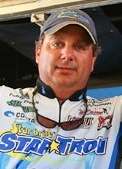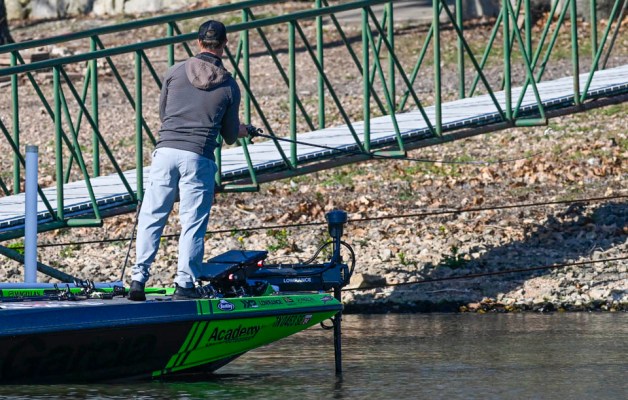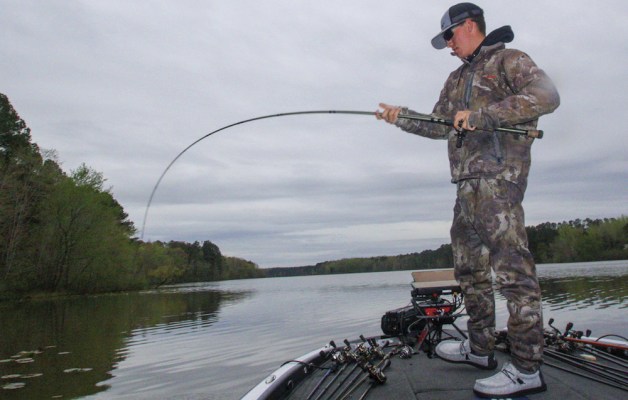I agree with Mr. Iverson — sometimes practice is a total waste of time. I spent 4 1/2 days practicing for the spring Bass Pro Shops Bassmaster Central Open on Ross Barnett Reservoir. I followed my usual “new lake” routine of spending a few days getting familiar with navigation and general areas around the lake, then zeroing in on what I felt were the key areas leading up to competition.
Financially, I probably would have been better off driving to Mississippi, stopping at the first gas station, handing a complete stranger a stack of signed, blank checks, turning around immediately, and driving back to Florida. Instead, I stuck around for a week or so and turned in one of my worst finishes in recent memory. I’m not sure standings-wise if it was my worst, but in my head it was. I missed it … completely.
Usually, it doesn’t take long after a bad event to figure out what went wrong. I’ve been pretty consistent over the last few years. When I’ve missed the money, I’ve always felt that I was close. I could always identify an error in execution, a missed adjustment in bait selection, a bad decision between two areas or just some plain bad luck.
This one was different, this one took some time — 11 hours and 23 minutes of the 12 hour drive home to be exact. I thought I fished well: accurate presentations, good baits, good areas (at least they were good in practice), good equipment and good execution when opportunity presented itself. Didn’t miss any bites, didn’t bounce any fish off the boat and didn’t break any off. No operator errors navigating the Star Tron Triton-Mercury rig through the shallow, stump-filled “Rez.”
So what went wrong?
I had no game plan.
Practice is about perfecting skills, being sharp. Shooting free throws until you can’t miss. Running routes until they are ingrained in muscle memory. Pitching a jig into a tea cup 25 feet away … every time. That’s practice.
Here's one of my favorite sayings: Amateurs practice until they get it right. Professionals practice until they cannot get it wrong.
Game planning is different than practice. Game planning is all about preparing for a specific event. Game planning accounts for the opponent, the playing field, the surrounding environment. In the stick-and-ball sports, this means understanding the opponent's strengths and weaknesses, field conditions and preparing for the anticipated variables — crowd noise, weather conditions, officials, injuries.
Tournament fishing is very similar, except the opponent is a fish, the field is a body of water and the anticipated variables are water conditions, angling pressure, access and weather.
Practice is about mindless repetition to train the instincts. Game planning requires thinking.
Looking back, I’ve noticed a trend that I’m usually stronger in the summer and fall. Spring tournaments have been hit or miss for me, and when I miss I miss big! Now I think I know why.
I’ve been practicing too much and not game planning enough. My skills and techniques are solid, but I’m not consistently putting myself in the right places at the right times.
Practice leads to routines. Routines are great when conditions don’t change. But when things are changing, routines can be devastating. I’ve fallen into a routine with my pre-tournament practice. This approach works for summer and fall tournaments. Things don’t as change much then. Fish tend to stay in the areas you initially find them. Yes, weather or current may change (dictating a change in bait or presentation), but the fish don’t go far.
Spring is different. Springtime bass often move fast and far with the slightest change in conditions.
In the spring, you have to game plan; you have to think.
At Ross Barnett, I didn’t account for the angling pressure or the changing conditions. I put myself in locations with dwindling numbers of fish that were not replenishing. I wasn’t thinking.
Most of the anglers that did well focused on a 5-mile stretch of water that featured numerous creek channels working through pad-stem invested shallow flats. Most of the Top 12 were in this stretch along with a good many others that left with a paycheck. I eliminated this stretch during practice. The fish weren’t there then.
The top finishers used their practice time to identify where the fish would be, not where they were before competition. They didn’t spend their pre-tournament days practicing. They developed a game plan to be in the right place when competition began. They were thinking.
As you prepare for your next event — especially those early-season events where conditions can change fast — break your routines and start thinking about your game plan.
I promise I will.





